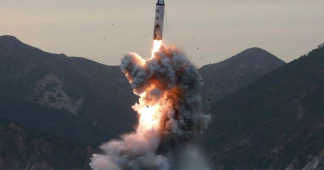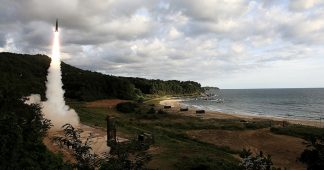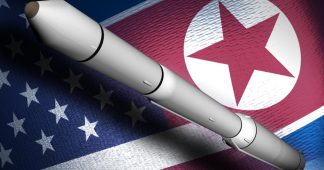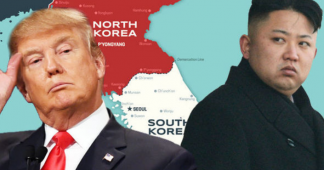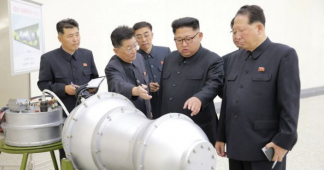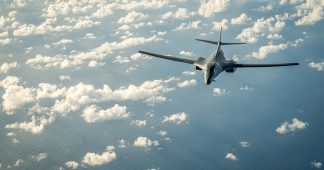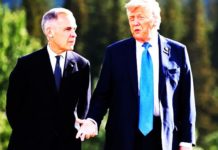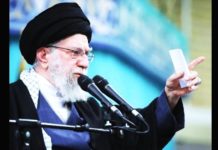The North Korean regime fired what is believed to be an inter-continental ballistic missile (ICBM) over Japan’s northern island of Hokkaido early on Friday morning. According to estimates released by the Japanese government, the missile was launched near the North Korean capital of Pyongyang and travelled some 3,400 kilometres before coming down in the Pacific Ocean. The missile was fired in apparent retaliation for … a raft of new sanctions against North Korea.
The sanctions, imposed in response to North Korea’s test of a nuclear device last week, are the harshest yet. While they did not go as far as the Trump administration wanted, nevertheless they will worsen the country’s already acute isolation. North Korea’s ability to purchase oil has been restricted and gas purchases blocked altogether. Its textile exports and ability to contract labour to work overseas have been banned, on top of previous sanctions against exports of iron ore, coal, lead and seafood.
The intensified economic pressure has been matched by flagrant military threats. The South Korean government this week openly discussed the formation of a specialized military brigade whose sole task would be to infiltrate North Korea and assassinate its leader Kim Jong-un and other top political and military personnel. South Korea also tested a precision cruise missile designed for assassination missions.
Even more provocatively, a top-level delegation of South Korean opposition party politicians arrived in Washington on Thursday to ask the Trump administration to pressure South Korean President Moon Jae-in to “request” the redeployment of American nuclear weapons to South Korea.
The American military withdrew nuclear weapons from the Korean Peninsula in 1991. The Pentagon is more than capable of incinerating North Korea, or any other country, from the US mainland, from the air or the sea. In the days preceding the missile test, US Secretary of Defense James “Mad Dog” Mattis toured nuclear missile launch silos in the US midwest. Air Force general John Hyten, who commands the long-range bombers that can unleash nuclear weapons from the air, boasted to journalists that the US response to any aggression by the North Korea would be “the destruction of their entire nation.”
The key US allies in Asia—Japan and Australia—issued predictable denunciations of North Korea’s latest missile test. The Japanese government labelled it an “extreme provocation.” Australian Prime Minister Malcolm Turnbull accused North Korea of a “dangerous, reckless, criminal act.” Later, Turnbull threatened: “If Kim Jong-un were to start a war, to attack the United States or one of its allies, he would be signing a suicide note. That would be the end for his government and thousands and thousands of people would die.”
US President Donald Trump has reportedly been “briefed” on the latest developments. In his initial response to the missile test, Secretary of State Rex Tillerson directly targeted China and Russia, insisting that both take “direct actions.” He said China provided the bulk of North Korea’s oil while Russia was the largest user of North Korean contract labour.
Yet another emergency session of the UN Security Council has been scheduled in New York for Friday. Tillerson’s statement suggests the US may renew its demand that China and Russia accede to a complete economic embargo of North Korea, enforced by a naval blockade.
Washington and its allies are doing everything possible to push the already besieged regime in North Korea into a corner from which it could escape only by a complete capitulation to US demands. In the final analysis, the launching of missiles and testing of nuclear devices is a desperate plea by the reactionary, nationalist clique around Kim Jong-un for better terms—including its own survival.
The military forces of all sides have been placed on the highest levels of alert. There is the undeniable possibility of a full-scale war being triggered by an incident along the border between North and South Korea.
The constant talk of a North Korean “attack” serves only to obscure the far more likely prospect of a massive first strike by the US and South Korea, backed by countries such as Japan and Australia. The illegal doctrine of “pre-emptive war” has been enshrined as a tool of US foreign policy since 2002.
A horrifying logic has been set in motion by the constant rhetoric from Washington that North Korea will not be permitted to have nuclear weapons capable of reaching the US, and that “all options are on the table.”
As the World Socialist Web Site commented on September 6: “With each ratcheting up of these threats to unleash a nuclear conflagration, the question is posed with increasing force: Will Washington go to war to make good on its war rhetoric? Have the threats themselves—and the determination to prove they are not mere bluffs—become a driving force in the march to a potential nuclear war?”
The 2003 invasion of Iraq was preceded by the barrage of lies that the regime of Saddam Hussein was directly threatening the US and its allies with “weapons of mass destruction.” Fourteen years later, a comparable script is being playing out, with bellicose calls for North Korea to be annihilated before it attacks the mainland US and destroys cities such as Los Angeles. The reality that North Korea does not have capacity, or the motive, to carry out an attack that would lead to its destruction, is simply being brushed aside.
The build-up toward an attack on North Korea is the continuation of 25 years of US interventions and wars to maintain its global dominance. The ultimate target is not just the regime in Pyongyang, but China, which is viewed by the most ruthless sections of the American ruling class as its greatest threat. Any war on the Korean Peninsula would economically and politically destabilise the Beijing regime, as well as fundamentally weaken its strategic and military position.
It is precisely the clash of such underlying interests that poses the danger of such a war escalating into a direct confrontation between the US and China, two nuclear-armed powers.
Excerpt of an article by James Cogan
15 September 2017
